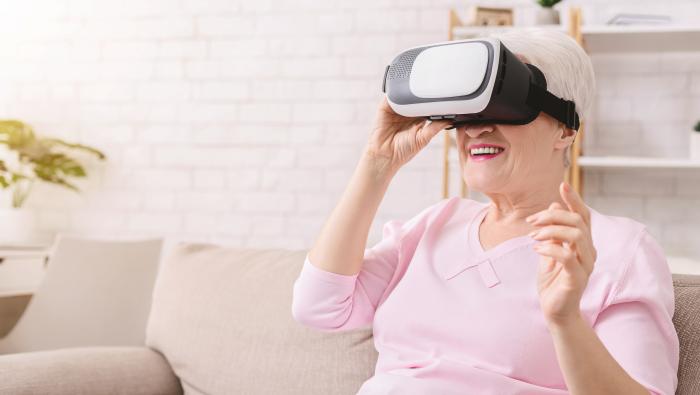A blog by Dr Felix Clay
Alzheimer's Disease (AD) is the most common form of dementia in the world and affects of many millions of patients and their families. Despite extensive research we do not have any effective medical treatment to modify the progression of existing disease. Support for those already affected will always remain a major area of research but focus is now also on identifying AD preclinically with the hope of finding ways to limit disease onset. My background in in Old Age Psychiatry and during my ARC Apprenticeship I looked into the evidence around an innovative approach to this research area using Immersive Virtual Reality (iVR).

iVR allows an individual to enter a computer generated world which they control intuitively. Depending on the goal this environment can be configured to challenge or support their spatial navigation and cognition. As we know spatial navigation is affected early in Alzheimer's Disease and therefore iVR is potentially effective for assessing early deficits and as a means of treating existing symptoms.
The relative efficacy of iVR for assessment and and the value of iVR in the treatment of Alzheimer's Disease is not well defined. Other reviews have looked at this area more broadly but none specifically at immersive technology which has the most powerful potential to engage patients intuitively and support their early deficits in spatial navigation affected as part of their disease process. I was supported to bring together a group of experts from the Psychiatry and Neurology Departments in Cambridge. We then proceeded to looked at this area systematically.
we know spatial navigation is affected early in Alzheimer's Disease and therefore immersive virtual reality is potentially effective for assessing early deficits and as a means of treating existing symptoms
We found that iVR is emerging as a viable method of assessing older adults and people with AD. Strongest benefits were seen when closely integrated with theoretical models of neurodegeneration and existing screening methods. Further randomized controlled trials integrated with clinical populations are required. This will consolidate the power of iVR for assessment of MCI and clarify treatment efficacy beyond current limited applications in physical rehabilitation.
Excitingly we already have evidence that iVR can detect preclinical deficits in spatial navigation which correlate with patients at high genetic risk of subsequent dementia. Development of this this research is hoped to allow low cost, intuitive assessment which can contribute to early treatment.
I am also interested in the potential of iVR for bringing people together, reducing inequality around functional deficits and reducing distress. In our review we saw that people with Alzheimer's Dementia mostly enjoy iVR technology which can support their deficits in spatial navigation and functional limitations. At the time of publication the world has changed significantly due to social distancing measures related to the COVID19 pandemic which are especially onerous for those with cognitive deficits. I hope iVR can be part of our future support for this vulnerable patient group.
A link to the full publication can be found at the Journal of Alzheimers Disease.
Felix completed a six month research apprenticeship in 2019, supported by ARC East of England.